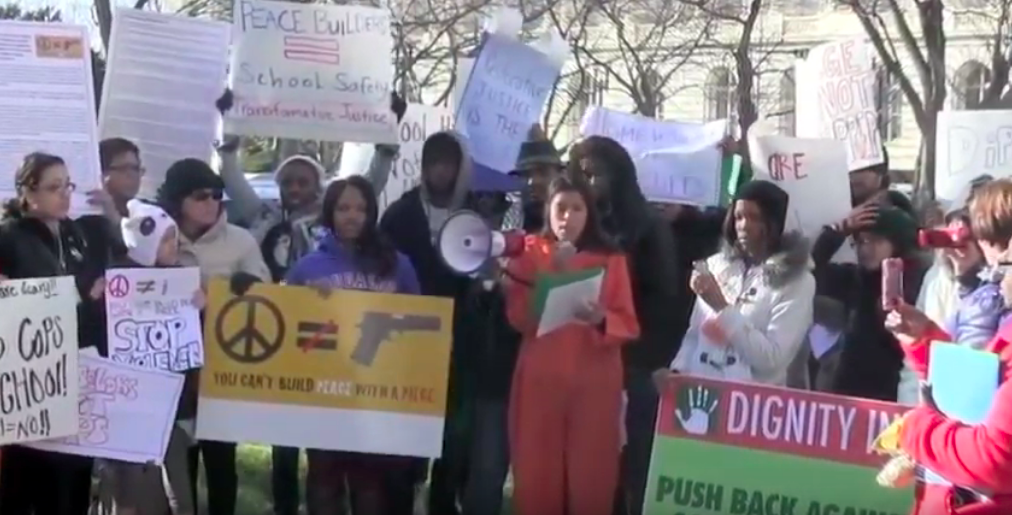Video: You Can’t Build Peace With a Piece Rally in Washington, D.C., 2013

On Monday, March 4th, 2013, youth from across the country held a rally on the ground of the U.S. Capitol followed by a march to the White House to call on Congress and the Obama administration to reject school safety policies that criminalize students of color, immigrant youth, LGBTQ students and students with disabilities, and push them out of school. Youth an parent leaders from California, Georgia, Illinois, Mississippi, New York and Washinton DC gathered to give testimony about the impact of increased police presence, armed guards, metal detectors and zero tolerance discipline policies in their schools and communities and to demand that the voices of youth of color be included in the conversation on gun violence prevention and school safety. Here is a collection of videos from the event.
Jasmine Jauregui
The rally began at 4 pm with an opening speech by Jasmine Jauregui, a youth organizer with the Youth Justice Coalition from Los Angeles, “We all traveled many miles to share the solutions that communities and students of color are proposing becuase we strongly believe that the solutions coming from Congress are not what will keep us safe. We have seen how attempts to increase school safety with armed guards, police and prison-like conditions have failed. We want to be certain that no student gets left behind in the legal system. We demand college prep, not prison prep.”
Tyrone Sinclair
Tyrone Sinclair, a youth organizer also with the Youth Justice Coalition from Los Angeles, CA, spoke to the crowd of students, parents, advocates and members of the press gathered outside the U.S. Capitol about his experience being expelled from a school that resembled a prison, and the conditions he faced on the streets of Los Angeles which led him to spend three weeks in the LA county jail.
Aiesha Vegas
Aiesha Vegas, a student and organizer with Youth on the Move from the Bronx, NY spoke about the effects on students’ ability to attend and succeed in schools where the environment resembles a prison.
Christina Cathey
Christina Cathey, a youth coordinator with Action Communication and Education Reform (ACER) in Duck Hill, MS, spole about the history of harsh discipline practices in Mississippi, including corporal punishment, and how this impacts students’ academic achievement and emotional health.
Christopher Covington
Christopher Covington a youth coordinator for the California Conference for Equality and Justice (CCEJ) spoke about the need for community participation in school discipline policy decisions. “We need Community Intervention Workers and Peace Builders in our schools who are members of the communities they work with because they have their ear to the ground and can resolve conflicts in the community without the use of guns or police. We need Restorative Justice Practices implemented in our schools. We know that schools where Restorative Justice Practices are implemented have improved school climates, dramatically decreased suspensions, and prevented violence and other disciplinary incidents. We know that this is what works
LaTonya Hawkins
LaTonya Hawkins, a parent leader with the Gwinnett Parent Coalition to Dismantle the School to Prison Pipeline (Gwinnett STOPP), gives an emotional testimonial about the impact of police oppression on her son’s education.
Manny Yusuf
Manny Yusuf, a 15 year old Youth Leader from DRUM (Desis Rising Up and Moving) in New York spoke about how a police presence in school intimidates immigrant youth. “Putting more police or school resource officers in schools does not prevent violence and shootings. Instead, I’ve seen firsthand how it increases the criminalization of youth of color and how immigrant youth, especially undocumented youth, will go to school while living in fear of being deported.
Orlando Armstead
Orlando Armstead of Critical Exposure, a Washington, DC-based nonprofit organization that teaches youth to use the power of photography to become effective advocates for school reform and social change, spoke about the conditions in DC-area schools and their work to move local schools away from the practices that lead to the criminalization of youth of color.
Rukia Lumumba
Rukia Lumumba, a parent of a 5-year old son and youth coordinator with Center for Community Alternatives of NY, spoke about the harmful impact that the presence of school police has on her son every day.
For more information, please visit http://www.dignityinschools.org/
